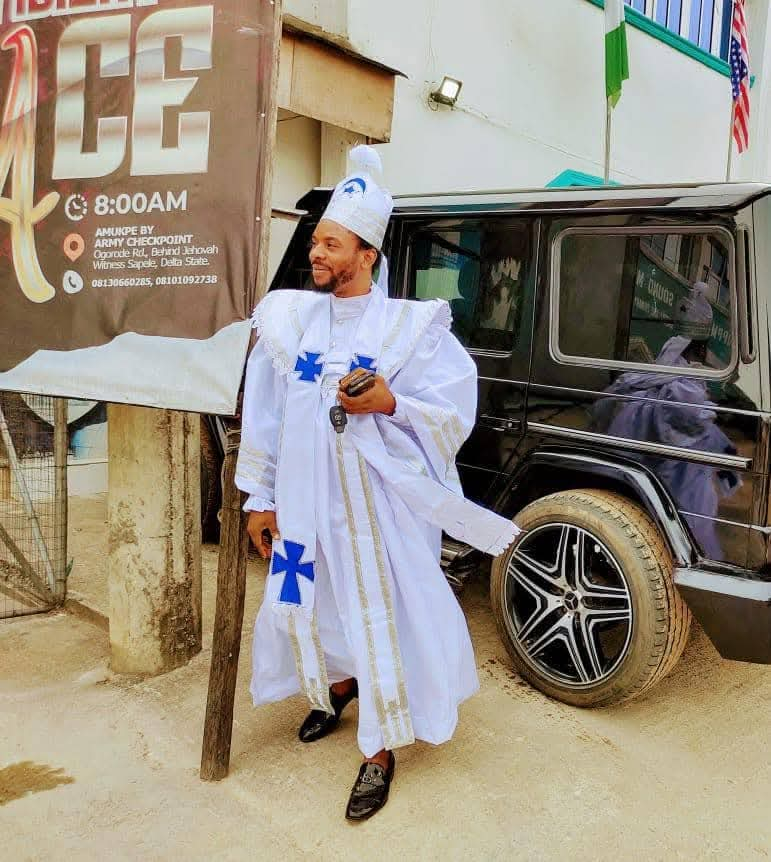Africa
Sexually Transmitted Anointing and Other Nigerian Heresies -By Patrick Iwelunmor
The time has come for us to reclaim the soul of our faith. The gospel is not a marketplace for exchanging anointing for obedience, nor a theatre for prophets to perform for profit. It is a call to holiness, justice and moral clarity. Until we confront these heresies with courage, both in our pews and in our laws, we will continue to produce prophets who confuse power with divinity, and congregants who mistake abuse, spectacle or wealth for spiritual experience.

There comes a time in the life of a nation when one must look squarely at its sacred spaces and admit, with sorrow and sobriety, that rot has crept into the sanctuary. The recent case involving Prophet Daniel Ololo of Delta State, who allegedly defiled three sisters from the same family, presses upon the conscience like a weight too heavy to ignore. Video clips obtained by this writer from the Facebook page of media activist Diamond Dietanuru Osakorigho, also known as Pararan Mock News, further show that the prophet allegedly impregnated a girl named Favour and has already made useful statements to the Nigerian Police. While the matter is still under investigation and the suspect remains innocent until proven guilty, the allegations point to a distressing pattern in the Nigerian church. The intention of this writer is not to judge the man of God but to call for reformation in the house of God.
The tragedy in cases like this is not only the alleged abuse but the theological deformity that enables it. Only in a spiritually confused climate can a preacher convince vulnerable followers that holiness can be transmitted through illicit sexual contact. It is a distortion so far removed from apostolic Christianity that it can only be described as a Christological aberration. Yet sexually transmitted anointing is not the only heresy that has taken root. Across Nigeria, other distortions abound: the unchecked prosperity gospel that equates wealth with divine favour, pseudo-prophetic declarations that instil fear or demand obedience, and miracle theatre that prioritises spectacle over substance. Each of these practices, though distinct, shares the same root: a misappropriation of spiritual authority for personal gain.
The deeper question is how the faith tradition founded on the liberating ministry of Christ has become vulnerable to such abuses. What has become of a people when the sacred is reduced to spectacle, when prophets operate as overlords rather than shepherds, and when fear is worshipped alongside God? The problem is not merely the conduct of one individual but the system that enables these heresies and shields them from scrutiny.
Across the land, we have witnessed an unhealthy culture of immunity around men of God, an indulgence that elevates charisma above character and miracles above morality. These self-proclaimed prophets quickly learn that the surest path to unchallenged authority is to persuade the vulnerable that questioning them is tantamount to questioning God Himself. Women are told that deliverance requires sexual intimacy, young girls are coerced into offering their bodies as seeds, and congregations are subdued by fear and false claims of spiritual power. Wealth is touted as a sign of divine favour, while poverty is portrayed as sin or spiritual failure. Spectacle replaces teaching, and obedience supplants discernment. These are no longer isolated abnormalities but symptoms of a deeper doctrinal collapse.
What makes the situation particularly disheartening is that those who claim to represent Christ often become the very predators from whom Christ came to deliver humanity. Nothing in the life or teachings of Jesus endorses exploitation, coercion, or deceit. The Christ who defended the vulnerable and confronted the powerful has been supplanted in some Nigerian churches by men who weaponise spirituality to prey on the very flock they should protect. These are not minor doctrinal errors. They are violations of conscience, dignity and the moral trust that holds communities together.
This is why this writer has consistently argued that the federal government should establish a religious crimes commission. Not to interfere with genuine worship, but to confront the rising wave of criminality hiding under ecclesiastical garments. Every sector in our national life has a regulatory framework, except the one that commands the deepest emotional loyalty of our people. Religion, more than politics, has the power to inspire, mobilise, mislead or destroy. When such power is left unregulated in a society struggling with poverty, insecurity and weak institutions, the result is predictable. Predators flourish because the system is blind, and the abused remain silent because they fear being branded enemies of the church.
A religious crimes commission would not hinder authentic ministry. It would protect it. The true shepherd has nothing to fear from scrutiny, transparency or accountability. It is the wolf in clerical robes who trembles at oversight. A system that swiftly addresses cases like that of Prophet Ololo would send a clear message that the Nigerian state will no longer tolerate preachers who cloak abuse in the language of deliverance, nor those who distort doctrine for personal gain.
The time has come for us to reclaim the soul of our faith. The gospel is not a marketplace for exchanging anointing for obedience, nor a theatre for prophets to perform for profit. It is a call to holiness, justice and moral clarity. Until we confront these heresies with courage, both in our pews and in our laws, we will continue to produce prophets who confuse power with divinity, and congregants who mistake abuse, spectacle or wealth for spiritual experience.
The case in Delta State is not an isolated blemish but a symptom of a festering wound. If we fail to treat it with seriousness, we should prepare for more painful eruptions. Nigeria deserves better. The church deserves better. And the name of Christ deserves far more honour than what these self-appointed apostles of exploitation have turned it into.























